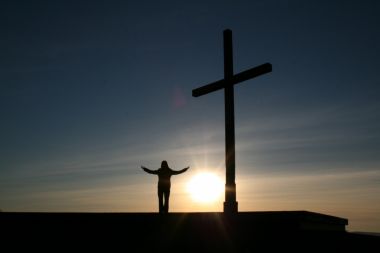Should Christians adopt 'The Benedict Option' and withdraw from civic society?

Questions over whether western, and specifically American Christians are persecuted and should withdraw from mainstream society have been raised by the publication yesterday of The Benedict Option, a book by the conservative writer Rod Dreher.
Dreher, the senior editor at The American Conservative, argues that the 'culture war as we knew it is over' and that social and religious conservatives 'have been defeated and are being swept to the political margins'.
To those who might argue that the election of Donald Trump undermines this case, Dreher anticipates the criticism and writes: 'The idea that someone as robustly vulgar, fiercely combative, and morally compromised as Trump will be an avatar for the restoration of Christian morality and social unity is beyond delusional.'

The answer, says Dreher, is to follow the example of the Benedictine order of Catholic monks and set up local Christian communities. The image on the book's cover is of a fortified island monastery in France, Mont Saint-Michel. Dreher suggests that conservative Christians should take their children out of public and 'mediocre Christian' schools, and ignore politics.
In an essay adapted from his book on the Fox website, Dreher writes: 'One of the most important pieces of the Benedict Option movement is the spread of classical Christian schools. Rather than letting their children spend 40 hours a week learning "facts" with a few hours of world-view education slapped on top, parents need to pull them from public schools and provide them with an education that is rightly ordered – that is, one based on the premise that there is a God-given, unified structure to reality and that it is discoverable. They need to teach them Scripture and history.
'Building schools that can educate properly will require churches, parents, peer groups, and fellow traveller Christians to work together. It will be costly, but it will be worth it.'
Of course, the idea of 'faith schools' is not a new one, and a debate rumbles on in the UK about their merits. But the section on education is part of a wider argument based on the premise that Christians in the US have been defeated and should withdraw from civic society.
Another area this applies to, for Dreher, is the workplace, on which a chapter forwards the persecution claim. Yet Rowan Williams, the former Archbishop of Canterbury and no liberal despite conventional wisdom, has said that it is wrong to say that western Christians are persecuted, and that those who say they are should 'grow up'.

Earlier this month, I argued on this website that 'there is a hint not just of defeatism but also of a dereliction of duty for Christians to withdraw from the world'.
In response to this, Rev Andrew Symes, the respected executive secretary of Anglican Mainstream, defends Dreher's concept. He says that 'suggesting that Christians should create spiritual strongholds, the Benedictine Option, is not advocating a withdrawal from the world'. Symes adds: 'Far from it – the monastic orders were in the front line of healing and education and the arts, as well as courageously evangelising and planting churches, sometimes in the face of violent pagan opposition.
'What they withdrew from I guess was trying to curry favour with the ruling establishments, and compromising on their principles in the process. Their strategy was to create centres of faith and worship uncontaminated as much as possible by wrong ideas, and from there go out, work and do mission, demonstrating and proclaiming the love of Christ.'
This, surely, goes to the very heart of the question of what it is to be truly evangelistic.
There is little sign that Dreher himself envisages Christians proceeding 'out' to do work and mission.
On the other hand, Symes is surely right about the positive role of monastic orders in society. As he is about the futility – at best – of Christians compromising – or 'trying to curry favour' – with the ruling establishments. It is certainly true that in the UK, an alliance of Church and state has apparently done little to encourage the a flourishing Church, while their separation in the US may have contributed to what remains, despite Dreher's dire warnings, a thriving Christian country.

Many Christians feel it is there duty to take the world as it is and work in it. Opus Dei (Work of God), no less, a Catholic group seen by many as the height of secrecy and conspiracy, contains a majority of lay members who do ordinary jobs alongside people of all faiths – and none.
And Jesus himself came down from Heaven into a broken world, to heal it. Yes, he rejected the ruling elites of the day. But the Church was born to grow, not to close itself off into an enclave. According to some traditions, the Jerusalem cross symbolically shows four strands representing the four Gospels, spreading out to all four corners of the earth.
The conversion of the world – and even of the US and certainly the UK – may be far off, perhaps further away than the nightmare scenario Dreher envisions of police rounding up Christians in their homes. It may be a losing battle. But surely it must remain in the sights of all Christians with a conscience about the world around them.











